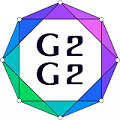Speaker
Description
Let $G$ be a permutation group on a finite set $\Omega$. Denote the set of orbits of the componentwise action of $G$ on $\Omega^k$ by $\text{Orb}(G,\Omega^k)$. Wielandt [1] defined the $k$-closure of $G$ to be the group
$G^{(k)} = \text{Aut}(\text{Orb}(G,\Omega^k)) = \{g \in \text{Sym}(\Omega) \mid O^g = O~\forall O \in \text{Orb}(G,\Omega^k)\}.$
A permutation group is called $k$-closed if $G = G^{(k)}$. In this talk we discuss $k$-closures of nilpotent groups.
Theorem. If $G$ is a finite nilpotent permutation group, and $k\geq 2$, then $G^{(k)}$ is the direct product of $k$-closures of Sylow subgroups of $G$.
This theorem generalizes results of [2,3] and provides a criterion of the $k$-closedness for finite nilpotent permutation groups.
Corollary. For $k\geq 2$, a finite nilpotent permutation group $G$ is $k$-closed if and only if every Sylow subgroup of $G$ is $k$-closed.
Acknowledgments. The work is supported by the Mathematical Center in Akademgorodok under the agreement No. 075-15-2019-1613 with the Ministry of Science and Higher Education of the Russian Federation.
References
[1] H. W. Wielandt, Permutation groups through invariant relations and invariant functions, Lecture Notes, Ohio State University, Ohio (1969).
[2] D. Churikov, C. Praeger, Finite totally 𝑘-closed groups, Trudy Instituta Matematiki i Mekhaniki UrO RAN, 1 (2021) 240–245.
[3] D. Churikov, I. Ponomarenko, On 2-closed abelian permutation groups, arXiv:2011.12011 (2020).

